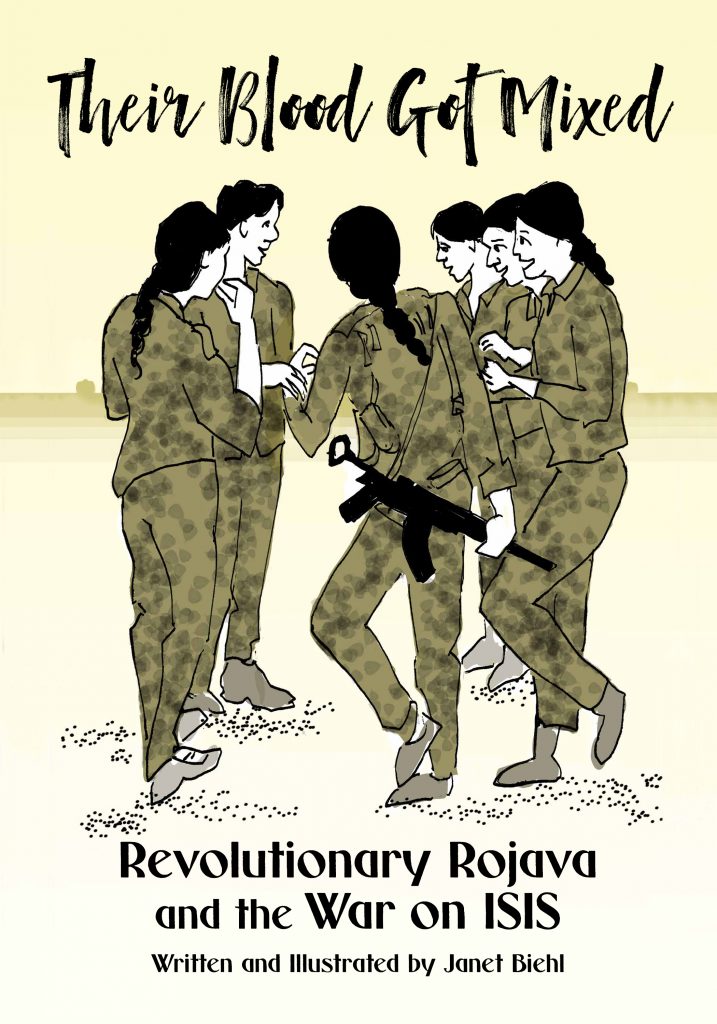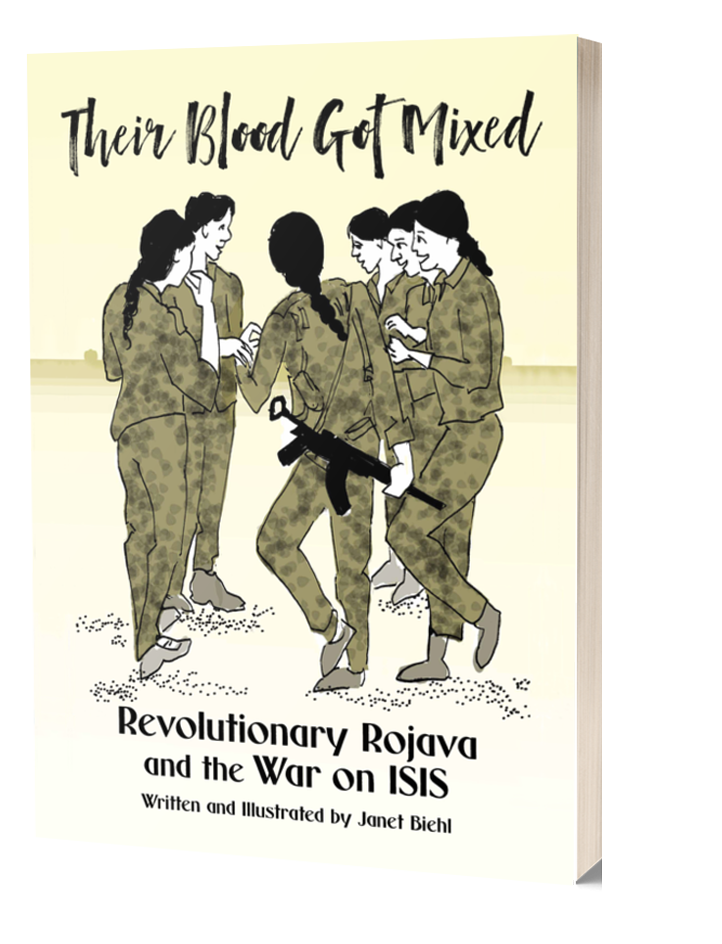By Paul Buhle
The Fifth Estate
This is a remarkable graphic novel that could be described as part of an emerging genre of comics journalism. Joe Sacco famously showed the way with his on-the-scene descriptions of conflict in the Balkans and the West Bank, graphic novels that reached all the way across the world in many languages.
Sofia Warren’s Radical, appearing just now, traces the work of an ardent socialist in New York’s legislature, a battlefield without the usual weapons, but a battlefield, nonetheless. Biehl’s visual world is the violent world of the Kurds and their struggle to win over other populations in the northeast corner of Syria to a different way of life.
Biehl comes to this work with remarkable qualifications. She spent some twenty years working with anarchist, ecologist, and communitarian Murray Bookchin, his romantic partner and collaborator in the last phase of his life.
Through working with him, she developed a sense for the ideas of Abdullah Öcalan, the foremost Kurd theorist-strategist and prolific author who somehow has survived decades in Turkish prisons.
Öcalan has acknowledged Bookchin’s influence, reading available works while in prison, rethinking borders and cooperative government structures as a way out of the existing state systems. Thus, the ideas of Bookchin, otherwise seemingly so far from practical effect, found their moment.
At any rate, they inspired Biehl to take up a Kurd invitation to travel to their territory and conduct the extensive interviews with community leaders and ordinary people, especially women. (A resulting documentary film will appear in 2023). She has no background as a comic artist. Indeed, beyond childhood enjoyment of Mad Magazine satires and a fondness for several New Yorker standards (Saul Steinberg and Charles Addams, for example), and apart from taking a few courses at the Art Students League in New York, she abandoned the very idea of drawing seriously until Bookchin died in 2006.
Like many other women comic artists of the new century, Biehl felt the impress of Alison Bechdel’s Fun Home. She recalls promising Bookchin, on his literal deathbed, that she would write his biography (it appeared in 2015), and then pondered: what next?
Biehl reasoned and discarded the idea of a graphic novel about his life. And, arrived at a subject close to the heart of those who followed Bookchin’s ideas, but not as a comic. She helped shape the documentary film shot on the living set, and returned home to realize that she had a comic in mind.
So, this is a nonfiction comic story that is also very much a women’s story. It begins in the wake of the catastrophic US invasion of Iraq and its aftereffects including the rise of ISIS in the regional vacuum of power, but also the rise of a new Kurdish Moment to realize autonomy of some kind outside of Turkey.
The ongoing civil war in Iraq is another factor in all this, alongside the failure of the Syrian Baath regime to feed its rapidly increasing population, and its own massive repression of protesters. ISIS invaders of Raqqa destroy every religious institution they can find, execute anyone who protests, and broadcast their pathos-ridden version of fundamentalism for all to see.
One of the great tragedies, among many, is the ISIS determination to wipe out age-old religious communities, including Assyrians and Yezidis, that had survived the arrival of empire after empire, and the reshuffle of the region with the breakdown of Western colonialism. The Kurds, who had managed to create a sort of secular culture, found themselves placed to lead a multi-religious coalition defending these smaller groups and making allies of Muslims opposed to the ISIS fanaticism.
Kurdissh activists, considered to be terrorists by Turkish leaders and often by most US officials plotting their usual divide-and-conquer strategy, stepped into the gap. In the Syrian city of Kobane, ISIS was defeated for the first time. The Kurds led the creation of the Syrian Democratic Forces (SDF) with real military success. Behind the lines, a sense of social solidarity leading to its practice occurred, with the help of texts from Öcalan and Murray Bookchin.
We see the comic pause here, for a page, to recall Murray up close. He is seen wearing those suspenders that I remember so well, an avuncular look that was also, in my 1970s eyes, the sight of an aged Jewish garment worker or furrier, part of a unique Left (with all the fractious branches) growing out of the particulars of class struggle and ethnic closeness.
Bookchin’s vision of an organic society and democracy works better in Kurdish territory than in the US, doubtless because the fractures of modern society with its individualization and consumerism make the needed connections so difficult. Then again, the vision of the Industrial Workers of the World, as set out in 1905, is so close to Bookchin’s vision that any student of US socialist history would see the more distant inspiration.
The Rojava Revolution, a phrase that may be too strong, but feels right, grows up centered in the Afrin, in Syria’s north, most of all, pushing out the Syrian army, setting up a government with many cooperatives, and an ardent commitment to women’s rights. Three surrounding cantons recreated themselves as seven cantons, and proclaimed visionary principles to be their practice.
Writing about anarchist collectives in Spain of the 1930s, Bookchin had, in a sense, predicted the form of government and military operation with a great degree of democracy within the ranks of the separate, all-female militia. About ten pages of comics tell the story of Biehl’s conversations with these women, and may be the most vivid pages of the book. Next, would be the following pages, of how gender roles emerged with what seems an unprecedented egalitarianism. Part of the work of the newer society was the recuperation of Kurdish history, including the women, from the Neolithic background of the region onward.
The very self-identity of the Kurds makes it possible, Biehl suggests, for Rojava to reach a social solidarity without expropriating the industries owned, naturally, by the rich; or ridding itself of oil production. Every new project must be supported by the public. Yet capitalism remains except in nonprofits and cooperatives now flourishing in several fields. Rojava University, founded in 2016, offered a different view of education or one held commonly in societies moving out of colonialism, and then lost to the power of local and global elites.
The struggle very much continues, even though a chunk of Kurdish territory has been lost. The US still regards leading Kurdish organizations as terrorist, and the international community has not recognized anything like a Kurdistan. But following Öcalan (influenced, in turn, by Bookchin’s writings), his movement had set itself more than a decade ago upon a vision that ardently embraced women’s rights as a fundamental part of the democratically-constituted councils at every government level.
I am not at all sure that the “ecology” part of Bookchin’s and Öcalan’s “social ecology” has truly found its way here, perhaps because the resources are so lacking for the sweeping changes of economy needed. But the vision is surely there.
Paul Buhle, editor/publisher of Radical America magazine in the 1960s, has edited fifteen nonfiction, historical comics since WOBBLIES! in 2005.
Sidebar: The Rojava Revolution
The Rojava Revolution took place in 2012 when three Syrian Kurdish regions declared their autonomy from Syria during the civil war there. A democratic, autonomous administration was created in order to establish a grassroots, gender-equal and ecological society.
The society is structured around councils with direct participation of the population (direct democracy as opposed to representative democracy). People are involved in a wide variety of political and social activities including the councils, the women’s movements, the health sector, and defense groups. There are all-women combat units and the councils are made up equally of men and women, a contrast with the prevailing norms in the region and elsewhere. There is a constant threat to Rojava by the Turkish and Syrian governments.
The Kurds, an ethnic group living across Turkey, Syria, Iraq and Iran, have been oppressed for centuries. Kurdistan, a geo-cultural territory, is the area where most of the Kurdish population lives, covering an important part of these countries although not recognized as a nation.
The official governments fear a potential Kurdish state, something promised to the Kurds by various Western governments at different times; a promise quickly forgotten. Abdullah Öcalan (then a Marxist) and others formed the Kurdish Workers Party (PKK) in 1978. While in prison, Öcalan discovered Murray Bookchin’s books and adopted many anarchist principles and ideas that have been applied to the Rojava Revolution.







